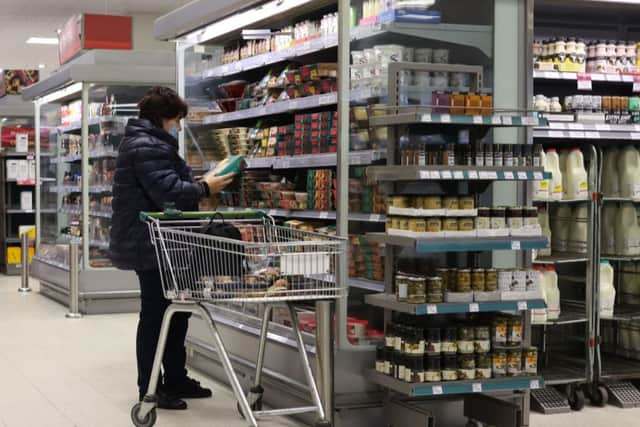UK inflation dips to 10.7% in November but surging food and energy costs keep households under pressure
and live on Freeview channel 276
The rate of inflation eased back by more than expected last month, dipping slightly from October’s 41-year high, official figures show.
The Office for National Statistics (ONS) said the rate of Consumer Prices Index (CPI) inflation fell to 10.7% in November, from 11.1% the month before.
Advertisement
Hide AdAdvertisement
Hide AdEconomists had expected CPI inflation to fall to 10.9% but the rate came in even lower than expected, marking a welcome decline from the eye-watering 11.1% seen in October when surging energy bills sent inflation to its highest level since October 1981.
The ONS data said a drop in the price of petrol and diesel were among the biggest drivers of falling inflation, with petrol unchanged between October and November this year, at 163.6p a litre on average, but rising by 7.2p a litre a year earlier.
Diesel price increases also eased, rising by 4p a litre this year to 187.9p, compared with a larger rise of 7.4p a litre a year ago. Second-hand car prices also helped CPI fall back, with a 5.8% drop in the year to November compared with a 2.7% fall in the year to October.


Experts believe that October was the peak for inflation and the worst is now over, although households still remain under pressure with soaring food and energy costs being the main drivers of inflation.
Advertisement
Hide AdAdvertisement
Hide AdFood prices are still rising - up by 16.4% on an annual basis last month - and energy costs still remain high, despite support from the government limiting annual bills for the average UK household to around £2,500 since October.
The ONS reported that the largest upwards contribution to the inflation rate in November came from rising prices in restaurants, cafes and pubs, led by alcoholic drinks. The rate of inflation in this sector of hospitality was running at its highest level since 1991, figures show.
Tobacco prices also rose by 0.1% in November, compared with a 4.2% rise a year ago when duty rates increased, and clothing and footwear saw a 7.5% annual increase on price tags, although this was down from 8.5% in October.
Loading....
ONS chief economist Grant Fitzner said: “Although still at historically high levels, annual inflation eased slightly in November. Prices are still rising, but by less than this time last year, with the most notable example of this being motor fuels.
Advertisement
Hide AdAdvertisement
Hide Ad“Tobacco and clothing prices also rose, but again by less than we saw this time last year. This was partially offset by prices in restaurants, cafes and pubs, which went up this year compared to falling a year ago.”
Responding to the ONS November CPI figures Dr George Dibb, head of the Centre for Economic Justice at IPPR, said: “Inflation reducing slightly is a welcome sign that inflationary pressures may be receding, but we are not through the economic danger-zone yet.
“Inflation is coming down around the world yet still above 10% in the UK. Importantly price levels remain high and have risen faster than incomes, so essentials remain unaffordable for some. This is on the brink of a costly economy-wide recession.
“There are now two things to look out for. First, how will the Bank of England respond and will interest rates continue to rise despite receding pressures? And secondly, how will the government continue to support the most vulnerable households to afford essential products?”
Bank of England expected to hike interest rates
Advertisement
Hide AdAdvertisement
Hide AdThe figures come ahead of the Bank of England’s interest rate decision on Thursday (15 December), when it is expected to announce another increase. A rise from 3% to 3.5% - 0.5 percentage points - is forecast by experts to rein in inflation.
Chancellor Jeremy Hunt said inflation is “the number one enemy” and bringing the rate down so that wages go further remains his “top priority”. He said: “The aftershocks of Covid-19 and (Vladimir) Putin’s weaponisation of gas mean high inflation is plaguing economies across Europe, and I know families and businesses are struggling here in the UK.
“Getting inflation down so people’s wages go further is my top priority, which is why we are holding down energy bills this winter through our energy price guarantee scheme and implementing a plan to help halve inflation next year. I know it is tough for many right now but it is vital that we take the tough decisions needed to tackle inflation – the number one enemy that makes everyone poorer.”
The fall in the rate of inflation may bring relief in both the Bank of England and the Treasury but a think tank has warned that families will still feel the pain of the rising cost of living crunch. Poorer families suffer more from high inflation because they spend a greater proportion of their income on energy and food, which have seen some of the sharpest price rises.
Advertisement
Hide AdAdvertisement
Hide AdJack Leslie, senior economist at the Resolution Foundation, a think tank specialising in living standards, said: “Britain may now be past its inflation peak, which is good news for policymakers at both the Bank and Treasury as they grapple with rising interest rates and public debt.
“But with price rises still massively outstripping pay rises – and Britain’s poorest families facing an inflation rate of over 12% – families are still getting poorer month-on-month and the cost-of-living crisis will continue to deepen in 2023.”
Comment Guidelines
National World encourages reader discussion on our stories. User feedback, insights and back-and-forth exchanges add a rich layer of context to reporting. Please review our Community Guidelines before commenting.
